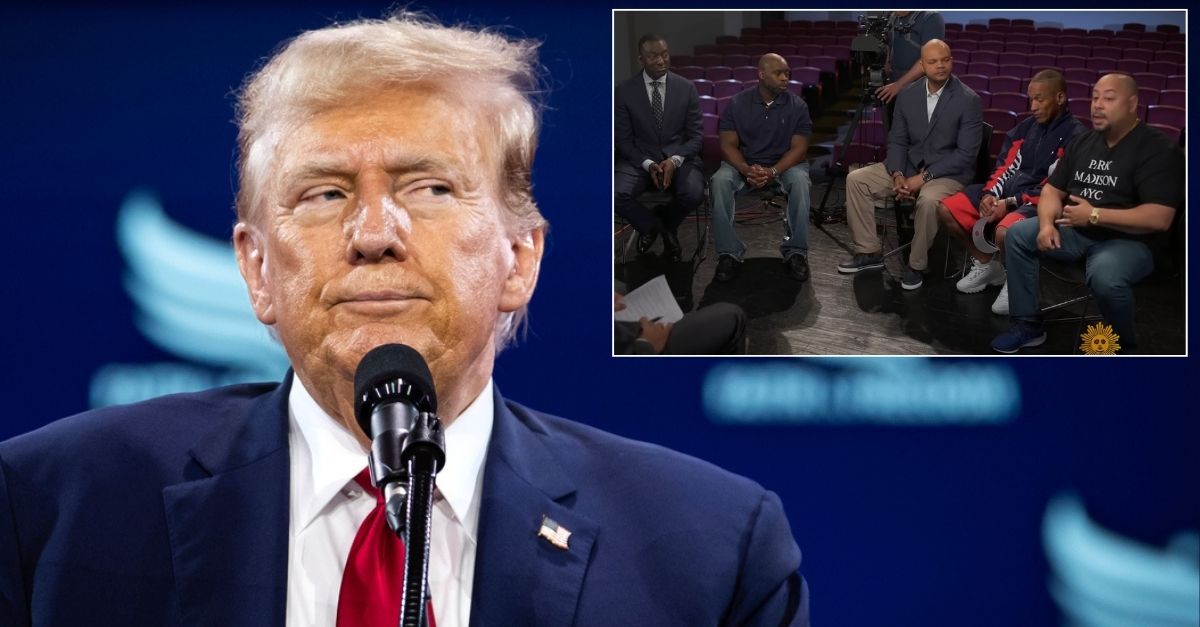
Inset, left to right: Yusef Salaam, Antron McCray, Korey Wise, Kevin Richardson, Raymond Santana (CBS Sunday Morning). Background: Donald Trump speaks at the annual Road to Majority conference in Washington, DC, June 22, 2024 (Allison Bailey/NurPhoto via AP).
The Central Park Five say President-elect Donald Trump is wrong on the law as he seeks to dismiss their defamation lawsuit against him over comments made during the presidential debate earlier this year.
In a letter motion filed in a Pennsylvania federal court on Friday, attorneys for the famously falsely-accused quintet said they “intend to oppose Defendant’s forthcoming Motion to Dismiss in its entirety.”
On Nov. 20, Trump requested a conference in anticipation of filing a motion to dismiss based on a failure to state a claim under the federal rules and the Keystone State’s anti-SLAPP statute — a state law that bars actions intended to chill free speech. Many states refer to such litigation as strategic lawsuits against public participation (SLAPP) and have created an easy vehicle to dismiss them at the outset.
Attorneys for the Central Park Five, however, say Trump’s attorney incorrectly invoked the anti-SLAPP law.
“Defendant invokes Pennsylvania’s anti-SLAPP statute,” the motion reads. “While the Third Circuit Court of Appeals has not yet spoken on this issue, district courts within the Third Circuit have concluded that state anti-SLAPP statutes do not apply in federal court.”
The plaintiffs also address the merits of the case.
In their original petition filed late October, Antron Brown, Kevin Richardson, Raymond Santana, Korey Wise and Yusef Salaam claim that during his lone debate with Kamala Harris, Trump “falsely stated that Plaintiffs killed an individual and pled guilty to the crime.”
In the pre-motion to dismiss requesting a conference, Trump argued that his statements constitute “non-actionable opinion, are substantially true, and lack defamatory sting.”
“Trump’s remarks during the debate, which referenced Plaintiffs’ past admissions in the Central Park case, represent his interpretation of public information and are protected expressions of opinion,” the Trump motion continues. “Further, the statements are substantially true when viewed in their full context, as they must be. Truth is an absolute defense to defamation under Pennsylvania law.”
The defense motion explains the context as follows:
Trump simply articulated his interpretation of the events at that time, specifically referencing Plaintiffs’ admissions of guilt made during their arrests. His technically incorrect use of the legal terminology “pled guilty” does not render the statement substantially false, particularly where the effect on the lay audience listener would be the same as the truth (which is that Plaintiffs “admitted” guilt).
The Central Park Five categorically reject the defense’s understanding of what constitutes truth — revealing a wide gulf between the parties’ positions in one of the first post-2024 election victory lawsuits against the 45th and 47th president.
The plaintiffs provide a handy laundry list to dispute the defense:
First, Plaintiffs never pled guilty to any crime relating to the Central Park assault.
Second, no one was killed during the Central Park assault.
Third, Plaintiffs were exonerated of all charges relating to the Central Park assault over twenty years ago. Publicizing Plaintiffs’ criminal proceedings while omitting reference to their subsequent exoneration is itself actionable defamation.
“Defendant’s statement was that Plaintiffs pled guilty to the Central Park assault and then changed their plea,” the Friday motion continues. “The truth is that Plaintiffs — who were between 14 and 16 years old at the time and unrepresented by counsel — gave false confessions which they immediately recanted upon their release from police custody. They then pled not guilty from the very outset of their criminal cases and were subsequently exonerated of all wrongdoing, including by conclusive DNA evidence and the confession of the true culprit.”
More Law&Crime coverage: Trump gets judge recused in Central Park Five defamation case after questioning the court’s ‘impartiality’
The response also rubbishes Trump’s “interpretation” defense as “unavailing” by pointing to a standard that allows the difference between fact and opinion to be “objectively determined” under Pennsylvania law. That standard, they say, only points in one direction.
“Here, Defendant’s statements that Plaintiffs pled guilty to a crime and that someone was killed can be verified as true or false — they are both false,” the Friday motion goes on. “Moreover, even where a statement can plausibly be interpreted as opinion, dismissal is still unwarranted if the statement could also be interpreted as a statement of fact.”
In sum, the heart of the plaintiffs’ response is that there are simply too many arguments between the parties for anything to be determined by way of motions practice in the lawsuit.
To that end, they say, a jury should get the final say on at least three issues: (1) whether Trump was trying to express a fact or an opinion; (2) whether Trump’s statement about the Central Park Five were substantially true or not; and (3) the “effect on the mind of the viewer” when Trump made the statements.
One particular claim during the debate could prove potentially relevant as the case goes forward, the Friday motion notes, almost off-handedly, in a potential preview of future arguments.
“Defendant’s letter completely fails to address the fact that Plaintiffs were never accused of killing anyone,” the Central Park Five explain. “Defendant’s statement at the debate that Plaintiffs ‘killed a person’ was fabricated from whole cloth.”
Have a tip we should know? [email protected]







